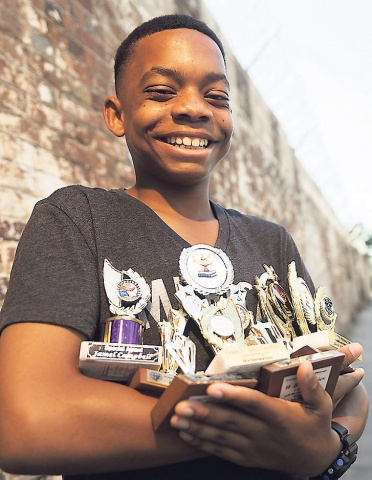
As part of a regular prenatal-care procedure, Janet Campbell, Jamel’s mother, was instructed by her doctor to do a test for sickle cell while in her third trimester. This was something the Lawrence Tavern resident was unfazed by at the time, because she was certain she did not carry the sickle cell trait. At that time, she had never been told by a doctor before that she had sickle cell. “When the result came back, they told me I had a trait of it and they needed to test his father next. Unfortunately, he also had the trait. We didn’t believe it at first, so he did the test two more times and they all confirmed the same thing,” Campbell. From this moment, it was imminent that Jamel was going to have the sickle cell disease. Subsequently, six months after he was born, on March 8, 2003, he was formally diagnosed with sickle cell anaemia. This is a disease in which there aren’t enough healthy red blood cells to carry adequate oxygen throughout the body. Its name is derived from the fact that the red blood cells become rigid and sticky and are shaped like sickles or crescent moons.
[video:https://youtu.be/yxu0S24ebOU width:600 height:250 align:center]
FAMILY SUPPORT MAKES A DIFFERENCE
Luckily for Jamel, his nuclear-structured family was determined to fight the disease together, and their first test would come four months after his diagnosis. “I remember putting him to rest on his father’s chest and he said to me, ‘Jamel stomach didn’t feel right.’ When we carried him to the doctor, we were told that his spleen became very hard due to blood flow complications,” his mother recounted. This resulted in Jamel undergoing a splenectomy, a surgery where someone’s spleen is removed, in June of 2004 at 15 months old. The family was also given a treatment outlay as well as some of the challenges Jamel was going to inevitably encounter. Fortunately for Jamel, he was very disciplined with taking his treatment and his bouts slowly began to reduce as he attended primary school. “I have to pay attention to the colour of my urine to determine whether or not I needed to drink more water. The same has to be done for my body temperature, which means I had to keep myself warm or my joints will start hurting immediately,” revealed Jamel.
DETERMINED TO EXCEL
Being very intrinsically motivated, Jamel refused to allow his periodic bouts of severe pain to restrict his academic performance at primary school. “I tried my best not to miss any day from school, but there were times my back would pain me a lot, especially in the evenings. My mother had to rub it tirelessly. This and the paracetamol would usually do the trick, though,” he lamented. He also voiced his initial displeasure at the fact that his condition restricted his ability to participate in physical activities. “I always love football and really wanted to play for my school, but my mother said no, due to my sickle cell. At first I was so angry but eventually i started to understand more; plus there were some afternoons when I was in a lot of pain.” Due to these afternoon pains, it was hard for him to study when he was home, so he capitalised on his school time and learned as much as he could. This allowed him to maintain an above-average grade and culminated with him being selected head boy for Unity Primary School. This was a mantle he proudly accepted and had no intentions of it just being a titular title. “One of the first things I started working on was the discipline. A lot of students were coming late to devotion because they were outside buying candy, so I rounded up my prefect body and put a stop to it,” reminisced Jamel. By the end of his primary-school tenure, his leadership skills were undisputed, but it was his other talents that many persons were surprised at. “My father taught me to play the keyboard at a very young age and I just kept practising. Somewhere along the way I picked up the drums, and I fell in love with both instruments,” said Jamel. He would exhibit his musical prowess at his primary-school graduation, where he played a musical number on the keyboard and his father was the resident pianist. It was a final bid farewell as the Jamaica College-bound student, who got a 94 per cent GSAT average, serenaded his peers.
NEW GROUNDS TO CONQUER
Entering high school brought new challenges that came in the harshest manner. One of the side effects of the disease is that persons develop physically at a slower rate than average. For a petite-size Jamel, the cascading satirical remarks about his height increased every day. “When I was in first form it affected me a lot, because it didn’t just come from classmates, it came from adults in the wider society,” he said. Not one to fold easily by these remarks, he focused more keenly on his school work and made the honour roll in grade seven. It is a position the fourth-former still currently holds as he is now concentrating on his two-year journey for his CSEC examinations. “I am really happy to be on the honour roll, because I put in a lot of work and I don’t see myself falling off anytime soon. The truth is, I don’t like to study at home because I always fall asleep, so I try to be very attentive in class,” Jamel jokingly said. He also considers it his first major step of fulfilling his dream of becoming a paediatric surgeon. “Clearly, what I experience as a child growing up made me have a lot of sympathy towards kids. It doesn’t have to be only sickle cell kids, I also want to help children with other illnesses.”




